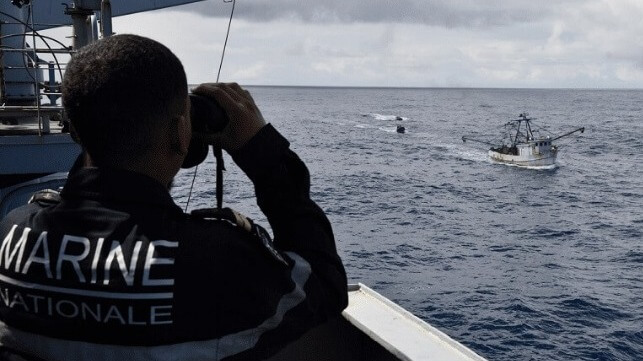French Frigate Seizes 2.4 Tonnes of Cocaine off West Africa

In the latest sign of the expanded European effort to interdict drug shipments at sea, a French frigate has seized a large shipment of cocaine from a stateless trawler at a position off the coast of West Africa.
An investigation by the Brazilian federal police, the British National Crime Agency (NCA) and the U.S. Drug Enforcement Administration (DEA) first uncovered the suspected smuggling operation, with support from EU agencies. The 20-meter fishing boat departed the Brazilian coast in mid-September, bound for the West African coastline. The route suggested that the ultimate destination market was in Europe, where retail cocaine prices are high.
Last Thursday, September 21, the French Navy frigate Ventôse moved to intercept the fishing vessel as it neared West Africa. With support from a Falcon 50 maritime patrol aircraft and an onboard Dauphin helicopter, a boarding team from Ventôse interdicted the trawler at dawn. (As the vessel was stateless, a high-seas boarding was legally authorized.) The team discovered and seized a total of more than 2.4 tonnes of cocaine aboard the trawler.

that matters most
Get the latest maritime news delivered to your inbox daily.
The interdiction was made possible by the persistent presence of the French Navy in the Gulf of Guinea. Given the limited ability of the coastal states to combat piracy and maritime crime in the region, France maintains one or two patrol vessels in the GoG at (almost) all times, with support from maritime patrol aircraft. The deployment aligns with the EU's "coordinated maritime presence" policy, which authorizes member states' maritime law enforcement operations in overseas regions.
The Brazil-to-West Africa route is an increasingly busy trade lane for the export of cocaine from South American producers to European users. As customs officers in the gateway ports of Antwerp and Rotterdam grow more adept at seizing multi-tonne shipments from containers, traffic is shifting to less thoroughly policed methods, like second-tier EU container ports and ship-to-boat transfers at sea. The dogleg route from Brazil to West Africa to Europe is also growing rapidly in volume, according to the Global Initiative Against Transnational Organized Crime. Containerized cocaine shipments from Santos to West Africa rose from 435 kilograms in 2014 to more than 27 tonnes in 2019.
